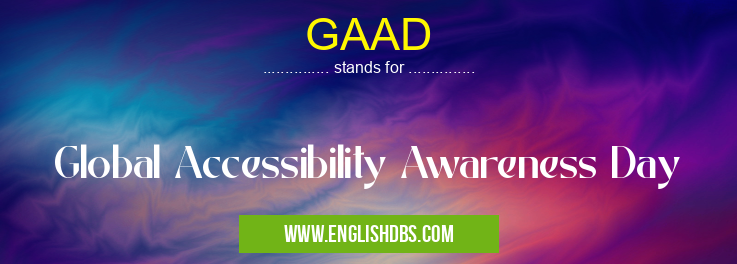What does GAAD mean in UNCLASSIFIED
Global Accessibility Awareness Day (GAAD) is an international event that focuses on digital access and inclusion for people with disabilities. The goal of the day is to get everyone talking, thinking and learning about digital access and inclusion and the impact it has on lives globally. This day encourages people all over the world to learn more about digital accessibility, how it can be improved, and how they can help contribute to making a more inclusive world. GAAD was started as an initiative by two web engineers in 2012, and since then it has been celebrated annually on the 3rd Thursday of May.

GAAD meaning in Unclassified in Miscellaneous
GAAD mostly used in an acronym Unclassified in Category Miscellaneous that means Global Accessibility Awareness Day
Shorthand: GAAD,
Full Form: Global Accessibility Awareness Day
For more information of "Global Accessibility Awareness Day", see the section below.
What Is GAAD?
GAAD is a day set aside each year to focus on digital accessibility. It's an opportunity for everyone to come together to learn more about the issues facing people with disabilities in accessing digital content, explore ways we can make our products more accessible for all users, and promote best practices for making websites, mobile apps and other technology as inclusive as possible. The official mission of GAAD is “to raise awareness about technology accessibility†by giving web developers, educators, policy-makers and user experience professionals an opportunity to discuss these issues openly during this special day.
Essential Questions and Answers on Global Accessibility Awareness Day in "MISCELLANEOUS»UNFILED"
What is Global Accessibility Awareness Day?
Global Accessibility Awareness Day (GAAD) is an annual event that takes place on the third Thursday of May and is dedicated to raising awareness and discussing digital accessibility and inclusion. The goal of GAAD is to get everyone talking, thinking and learning about digital (web, software, mobile, etc.) access/inclusion and people with different disabilities
Who should attend GAAD events?
Everyone! GAAD events are designed for anyone interested in learning more about accessibility — this includes developers, designers, content strategists, user experience professionals, project managers, accessibility advocates and experts. People living with disabilities are especially encouraged to attend!
How can I get involved?
There are lots of ways to be involved in Global Accessibility Awareness Day (GAAD). You can join the online conversation on Twitter using the hashtag #GlobalAccessibilityAwarenessDay or host a physical event — like an accessibility-related meetup or workshop - at your school or workplace. You can also share resources about digital accessibility with your network via blog posts or social media posts.
Does it cost anything to participate in GAAD?
No! Participation in Global Accessibility Awareness Day is free! Anyone can join the conversation online using the hashtag #GlobalAccessibilityAwarenessDay or host an accessible-related event without any associated costs.
When does Global Accessibility Awareness Day occur?
GAAD occurs on the third Thursday of May each year. This year's event falls on May 20th 2021.
Are there any virtual events happening on GAAD?
Yes! There are usually lots of virtual events hosted around the world during Global Accessibility Awareness Day such as talks, seminars and webinars. Check out our website www.gaad.org for more information about virtual events taking place near you!
Final Words:
As technologies continue to evolve at breakneck speed, there are massive implications for those with disabilities who have difficulty navigating websites or using certain software applications or hardware devices. While efforts have been made in recent years to make technology more accessible via features such as dark mode or voice commands, Global Accessibility Awareness Day provides us with an opportunity to reflect on how much progress has been made so far — while also bringing attention to areas where further improvement needs to be made if we want everyone around the globe to enjoy equal access.
